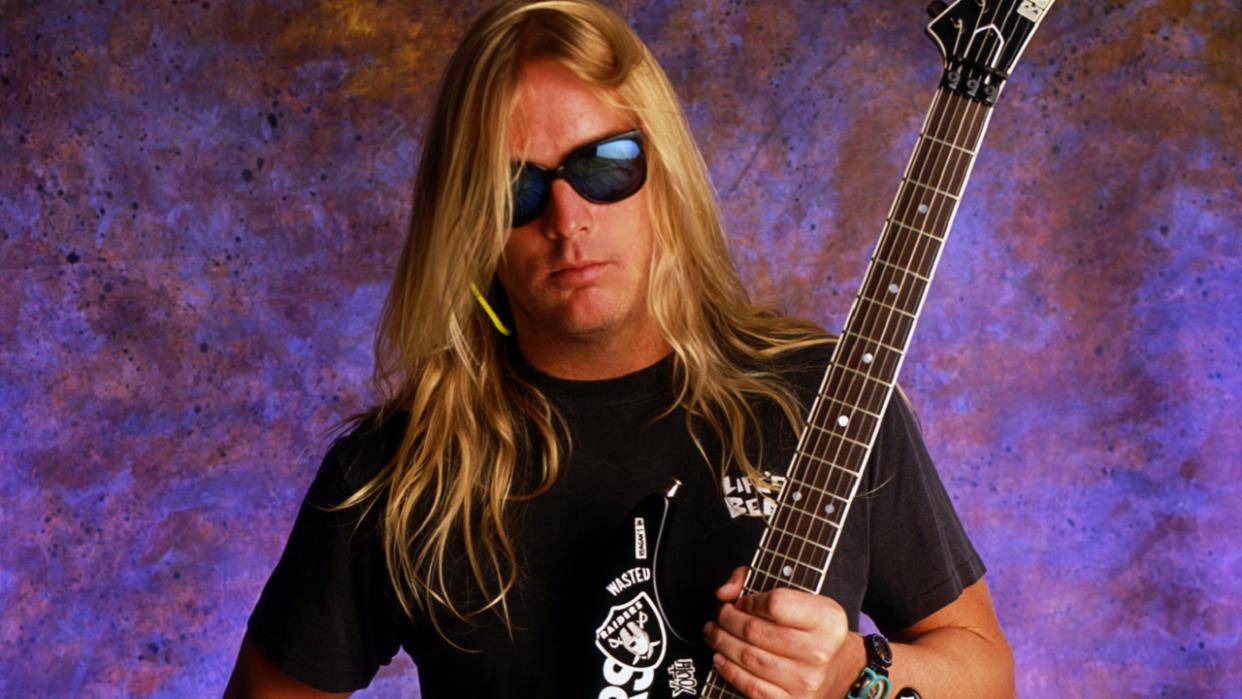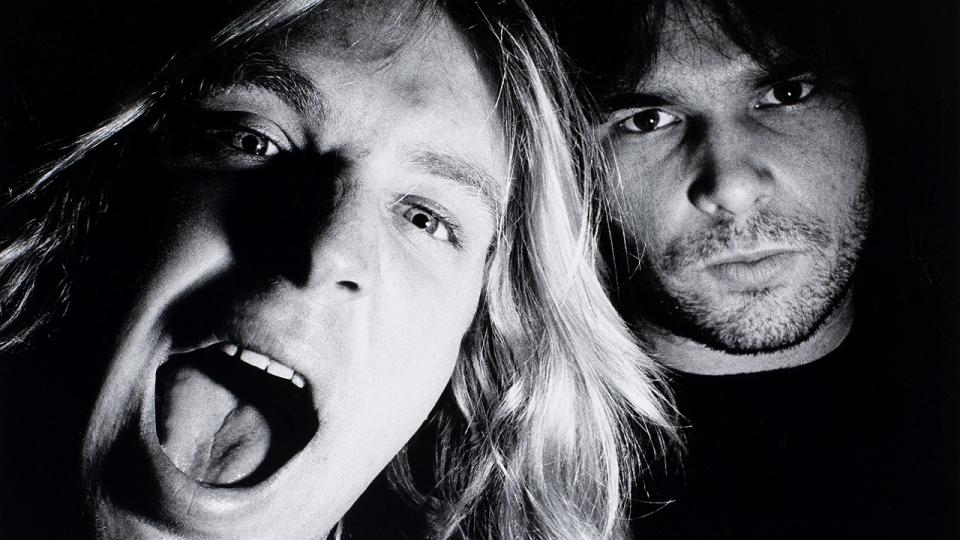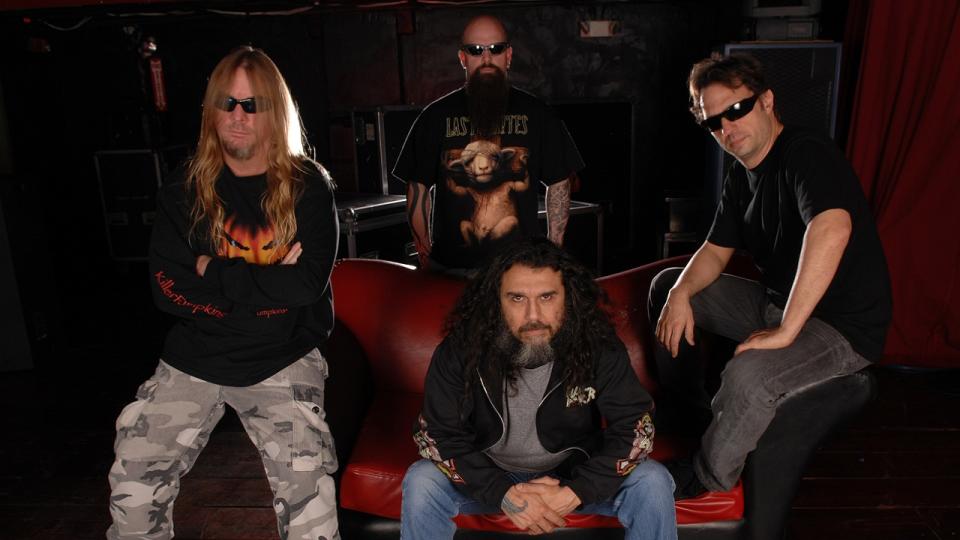"He was Slayer. He affected a lot of people and he didn’t even realise it.” The life and tragic death of Slayer’s Jeff Hanneman

For almost 30 years, Jeff Hanneman was a formidable presence at Slayer shows, standing stage right, wearing a black t-shirt or an Oakland Raiders jersey with camo shorts or athletic leg and shin guards. He never smiled. His blond, sweaty hair frequently obscured his face as he banged his head. His right hand was a blur as he sawed his pick back and forth on his guitar strings.
In his home studio, he cast even more rays of darkness across Slayer’s insidious art, penning many of their most memorable songs, including Angel Of Death, Raining Blood, Chemical Warfare, South Of Heaven, Dead Skin Mask and War Ensemble, as well as writing the music for two Grammy award-winning tracks, Eyes Of The Insane and Final Six.
Offstage and between gigs, however, Jeff was barely heard from, avoiding fans and the press, and disappearing to his home in Hemet, California in Riverside County, 100 miles from Los Angeles, when Slayer weren’t on tour. “He wasn’t big into fame,” says former Slayer guitarist Kerry King, Jeff’s six-string partner for 30 of the band’s 38-year existence. “He didn’t give a shit about being famous, so he could never really understand why anybody wanted to talk to him. He just wanted to do his thing.”
That combination of dedication to the cause of Slayer and disdain for the spotlight earned Jeff the respect of many metal fans. As did the fact he was one of the architects of thrash, and a man who kept Slayer bristling with the intensity of hardcore punk long after many of their contemporaries had become more commercial.
“I love heavy, heavy music, but I’m super-into really good songs and Jeff was a great songwriter,” says Blake Ibanez, former guitarist with Power Trip and currently of Fugitive. “The way he and Kerry played was super-tight and aggressive. And you can hear their influence in everything from crossover hardcore to death metal and black metal.”
Kerry King was 17 when he first met Jeff Hanneman in a low-rent warehouse on the outskirts of Los Angeles. It was 1981, and Kerry was there to audition for a bunch of middle-aged rockers who needed a guitarist for their covers band, while Jeff, also 17, was working as the doorman for the building. As Kerry suffered through the audition, Jeff plugged a guitar into a practice amp in the lobby and began riffing away with the enthusiasm of someone who had been playing guitar for all of seven months.
“When I left, I saw Jeff and said, ‘Hey, I know that song. Are you in a band?” recalls Kerry. When the blond kid replied that he wasn’t, Kerry asked if he wanted to be in a band? “Fuck yeah!” came the response. The band Jeff had been recruited to was the nascent Slayer, featuring Kerry alongside bassist/vocalist Tom Araya and drummer Dave Lombardo.
They played their first gig on Halloween 1981. Their set consisted of covers by Deep Purple and 70s rockers Montrose, as well as a trio of Judas Priest songs: Genocide, Tyrant and Desert Plains. The musical chemistry between the two guitarists was undeniable from the beginning, even if they were coming at things from different directions. Kerry was into Judas Priest and Venom. By contrast, his new partner had been introduced to Black Sabbath by his sister, but it was a love of California punk that led him to write speedy riffs and unhinged solos filled with caterwauling whammy bar flurries.
“Soon after I met Jeff, he got really into West Coast punk like Adolescents and D.I.,” says Kerry. “I couldn’t understand that at the time because I didn’t see the musical value in it. I got into it later, of course, but I had to play catch-up.”
Together, they began writing original songs such as Aggressive Perfector and Ice Titan (whose ending was repurposed for the Reign In Blood track Altar Of Sacrifice). Their riffs were fast, tight and sharp as razor wire, while their leads resembled strangled cats – an approach that only intensified as the years passed.
“Jeff wrote really bizarre chromatic riffs that weren’t built around traditional scale structures,” says Exodus guitarist Gary Holt, who replaced Jeff in Slayer in 2011 after he became too sick to tour. “When I had to start learning these songs, I’d always do these little things wrong at first, because I was trying to learn them more in this traditional way. But after you get in his head, you start to figure out how he did these weird, cool things.”
Jeff’s offbeat, iconoclastic songwriting was an extension of his elusive personality. He didn’t flow with the mainstream, and he didn’t want to. But for a few years at least, he enjoyed hanging out and drinking with people he knew from the metal scene, especially musicians whose bands he liked.
“Man, Jeff was one of the coolest dudes once you got to know him,” says Katon W. de Pena, frontman with thrash lifers Hirax, whose band Slayer opened for back when the latter still wore black eyeliner and red leather pants. “One night we were all partying downstairs at [ex-Metallica bassist] Ron McGovney’s house, and Jeff just disappeared. So, I go upstairs to go to the bathroom and as I’m going up, I see Jeff passed out. I just stepped over him ’cos that’s what we did back in those days. And he stayed there for the rest of the night.”
As much as he enjoyed partying with his friends, Jeff was never especially sociable. After shows, he stayed backstage or in the band’s van or bus until the crowd cleared out. He wasn’t interested in signing autographs or doing interviews. He wasn’t just shy, he was almost embarrassed by Slayer’s growing success. Jeff’s anti-social tendencies may have been exacerbated by his strict father, who disciplined his youngest son whenever he misbehaved.
“I think that he had a pretty rough upbringing, so he was very guarded and shy, and it took a while for him to warm up to people,” says Metal Blade Records founder and chairman/ CEO Brian Slagel, who discovered Slayer when they opened for another Metal Blade band, Bitch, and subsequently signed them to his label. When he wasn’t with the band, Jeff enjoyed being with his girlfriend, Kathryn, whom he met at a Slayer show in 1983 after pulling her from the audience and passionately making out with her onstage. Soon after, Kathryn would pose as a bloodied woman ravaged by the band in one of Slayer’s first publicity photos; the pair would get married in Las Vegas in 1989.
Jeff loved animals, played videogames, built models and spent much of his spare time watching American football, hockey and The History Channel. He also liked reading about World War II. Kerry says he was the closest member of Slayer to his bandmate, but admits that none of them were fast friends and when they weren’t on tour they rarely communicated.
“Jeff and I were like business partners,” he told Guitar World. “Was he my friend? Of course he was my friend. But we didn’t really act like that. It sounds horrible, but it wasn’t horrible. That was just how it was.”

Slayer’s time on Metal Blade spanned three releases: the Judas-Priest-on-meth debut album Show No Mercy in December 1983, the following year’s apocalyptic Haunting The Chapel EP, and the incendiary blasphemy of 1985’s Hell Awaits album. Their burgeoning infamy in the metal underground saw them snapped up by Def Jam, the hip hop label founded by producer/music-mogul-in-themaking Rick Rubin.
Their first album for their new label would be the one that sealed their notoriety. Reign In Blood was a violent, 28-minute blast of noise and energy. It was surrounded by controversy even before it was released, due to its opening track, the Hanneman-penned Angel Of Death. The song, which graphically chronicles the sadistic medical experiments of Nazi surgeon Josef Mengele at the Auschwitz concentration camp during World War II, prompted Def Jam distributor Columbia Records to refuse to handle the album (Geffen Records eventually stepped in to release it).
The guitarist’s fascination with the macabre had long been part of Slayer’s DNA, but his most enduring obsession was with the Third Reich. Long before he wrote Angel Of Death, Jeff named the band’s fan club ‘Slatanic Wehrmacht’ after the WWII-era German armed forces. He collected Nazi memorabilia, named his pets after German war figureheads, and even modelled his wedding right after that of Reinhard Heydrich, a decorated SS officer and a principal architect of the Holocaust. He owned hundreds of books about Nazi Germany and decorated the frets of one of his guitars with the double lightning bolt logo of the SS.
To some, this interest was inexplicable and unhealthy. But for Jeff himself, delving into and filtering through the messy history of the Holocaust and other atrocities was an inspiring study of the darkness within mankind. When I spoke to him in 2010, he denied that he was celebrating the Nazis and everything they stood for. “I’ve got some German World War II artefacts and a lot of people don’t understand it,” he said. “They say, ‘Why would you have that in your house?’ But it’s cool. It’s evil. It’s part of what being in Slayer is. And it’s a major part of history. It doesn’t mean I’m a Nazi, because I’m not. But some people believe what they want to.”
He added that he had been approached more than once by members of far right organisations who mistakenly saw him as one of their own. “I’ve had three occasions over the years where somebody will go, ‘Pssst, hey! I’m part of this Aryan World Nation group and we’re thinking of having you speak.’ And I’m like, ‘Why?’ And they’ll go, ‘Aren’t you…?’ And I’m like, ‘What?! No. Go away. You don’t get me at all.’”
Perhaps the key to understanding this fascination with one of the darkest periods in history lies in his upbringing in working-class Oakland, California. His German-American father fought on the beaches of Normandy in World War II, and brought home medals taken from the bodies of dead German soldiers, many of which he gave to Jeff. The guitarist’s older brothers, Michael and Larry, fought in Vietnam and the family often talked about war at the dinner table. Exposure to violent imagery from an early age made the young Jeff curious about war and obsessed with mortality.
“I used to think about dying a lot, all the time,” he said. “Even as a kid, I didn’t buy into the whole religious thing. I thought when you’re dead, that’s it, which was scary. I was like, ‘What, no more me? No more ice cream? No more nothing?’ I guess I did that so much as a kid that I got used to it.”
The success of Reign In Blood and the albums that followed – 1988’s South Of Heaven and 1990’s Seasons In The Abyss – drew more attention to Slayer. Jeff would get recognised in and around Los Angeles even when he was just hanging out with friends, something that irked the guitarist. He and his wife moved out of Los Angeles to Hemet, where they had more land and privacy, and Jeff started coming to band practice with songs fully demoed. He’d make the 90- minute trek to Tom Araya’s garage four to six times a week to practice, but he and Kerry no longer collaborated the way they had when they wrote the band’s first five albums.
“Driving that far almost every day will wear on you,” Kerry says. “It became a big bummer, so as time went by, Jeff showed up less and less at Tom’s. So, I’d do my songs on my own and he’d do his. It didn’t bother me. My attitude was, ‘If someone else finished it, great. Now I don’t have to do it. It’s a great song, good for you. Now, let’s play it.’”
Slayer released three more albums throughout the 1990s, each of which charted in the US Top 50. The guitarist remained in fine songwriting form for 2001’s God Hates Us All, 2006’s Christ Illusion and 2009’s World Painted Blood, and his onstage chemistry with Kerry was as strong as ever. But he had been drinking more and more, and by the mid-00s his alcohol intake had reached the point where he would hit the bottle as soon as he woke up.
The death of his father in 2008 hit him hard, while his physical health was affected by his heavy alcohol use causing uric acid build-up, which worsened a progressive arthritis problem he battled in 2009 and 2010. He was already losing playing speed and coordination before the event in January 2011 that would be a factor in his death. While relaxing in a jacuzzi, Jeff was bitten by what is believed to have been a highly venomous brown recluse spider.
Soon after, he developed the ‘flesh-eating’ bacterial infection necrotising fasciitis, which rapidly spread through his arm and became life-threatening. Doctors put him into an induced coma and operated to prevent the infection from spreading to his vital organs. They were able to save his life and arm, and, he hoped, his career. After more surgeries, staples and skin grafts, he returned home and tried to rehearse again with Slayer.
“He wanted nothing more than to come back and be onstage and perform,” says Kerry. “And he was progressing, but not far enough to where he could nail the fast stuff. We were like, ‘Listen dude. Everyone wants you to be playing with us, but we gotta have you performing at the level that everybody’s used to seeing you at.’”
Jeff’s final appearance with Slayer was at a Big 4 show in Indio, California on April 23, 2011, when he took the stage to play Angel Of Death and South Of Heaven. The crowd was ecstatic, and fans hoped the performance would mark the first step towards a full return to the band. Behind the scenes, the guitarist’s bandmates tried to convince him that even if he couldn’t play well enough to perform, he could still write Slayer songs while he was recovering. But for Jeff Hanneman, it was all or nothing. When he realised he would never recover enough to make a proper return to the stage, he gave up.
“It was terrible, but you can kind of understand it,” says Metal Blade’s Brian Slagel. “Being in Slayer was Jeff’s identity from when he was 17, and to have that taken away in such an odd manner, there was just no way to fix it.”
Messages and texts from the Slayer camp to the guitarist frequently went unanswered, and the distance between the two parties began to grow. Yet Kerry says that neither he nor Tom gave up on Jeff eventually turning a corner and rejoining the band. The latter even sent Tom a song he had been working on, and the two began exchanging texts. Then the messages stopped and the singer learned that his friend was back in hospital for what would be the last time.
“I was home with my family when I found out he had died,” Tom told Guitar World. “The phone rang, and my wife answered it, and she had this look of dread on her face. She handed me the phone and didn’t say anything, and it was our manager, Rick [Sales], and he told me. I hung up the phone and went to my room and I cried.”
“It’s crazy because he was actually getting better,” Kerry says now. “Personally, I think that had he gone forward for a couple more weeks and not been drinking, maybe he would have gotten back to where he needed to be to do an entire Slayer show again. We always thought he would come back. It just never materialised.”

Jeff Hanneman died as a result of liver failure on May 2, 2013, in his hometown of Hemet, California. He was 49. Members of Metallica, Megadeth, Anthrax, Disturbed, Fall Out Boy and countless others paid tribute, as did the Oakland Raiders, his favourite American Football team. Two years later, Slayer released their 12th, and final, studio album, Repentless. The music was largely written by Kerry King, though it did feature one Jeff Hanneman song, Piano Wire. While it was a solid offering, it lacked the late guitarist’s unsettling touch.
The band played their last-ever show on November 30, 2019, with Gary Holt once more taking Jeff’s place, as he had for the previous eight years. “I didn’t know what was going on at home with Jeff the whole time I was in Slayer,” says Gary of his stint with the band. “I had no idea. The band was like, ‘We still need you,’ and I thought, ‘Alright, I’m having fun here and keeping the seat warm for you. C’mon back.’ And then, you know, I got the news that he passed away.”
Today, 10 years after his death, Jeff Hanneman remains instantly recognisable but unknowable. Yet the music he made with Slayer has ensured his place in the metal pantheon, his songs and attitude embedded deep with metal’s DNA. “By all accounts, he was the band,” Tom Araya told Guitar World in 2014. “I’m amazed at how many people he touched. They hardly knew him, but he affected a lot of people. And he didn’t even realise it.”
